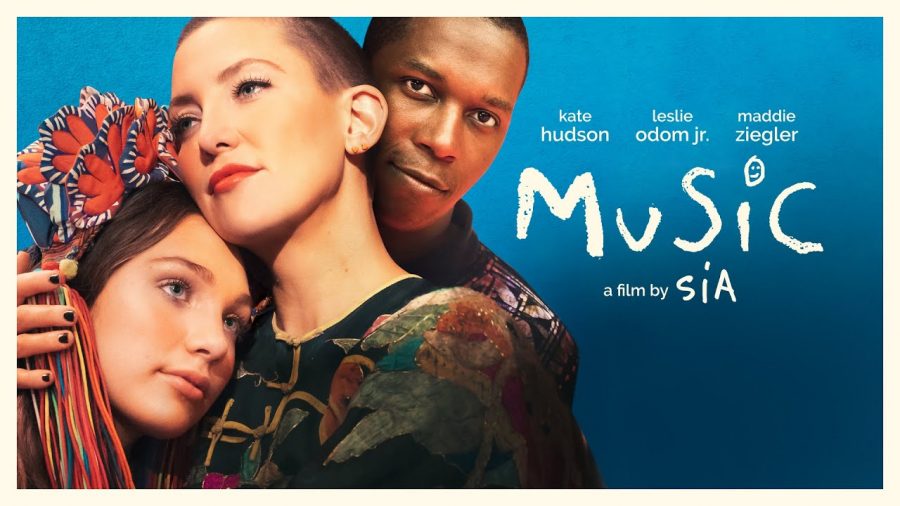Sia’s movie “Music” stirs controversy over lack of autism representation
February 26, 2021
On Feb. 12, 2021, singer-songwriter Sia released her new movie “Music” for streaming on platforms such as Amazon Prime Video and YouTube Movies, where viewers can pay to rent or buy the movie. The movie follows an adolescent girl named Music, who has nonverbal autism and is played by Maddie Ziegler, following the death of her grandmother and her estranged half-sister Zu (played by Kate Hudson), who takes over her care.
The movie has been nominated for two Golden Globe awards: Best Performance for an actress for Kate Hudson and Best Motion Picture in the Musical/Comedy section. Despite its inclusion of well-known actors, including Leslie Odom Jr., and nominations for prestigious awards, general reviews are much more critical of the film. Senior Olivia Blumenthal, a student in Edina’s Theatre for All class, has been following the release of this movie on social media since its announcement. “I just hope that no awards are given to this film because it would be normalizing ableism and showing that this type of offensive film is okay, which the Autistic community has said it is not,” Blumenthal said.
On Rotten Tomatoes, “Music” earns a low rating of 13 percent, and the critic consensus is reported as “offensive in its depiction of autism—and painfully misguided in essentially every respect—Music is a vanity project that begs to be turned down.”
The main criticism against the film is that it was created by a neurotypical woman and the lead actress is also neurotypical, rather than allowing austic directors and actors to tell their own stories. Lisa Hanson, a special education teacher and co-teacher of Theatre for All, also takes issue with austic professionals being excluded. “There are many very capable autistic actors that could have been cast in this role. I have seen it firsthand in our Theatre for All program. All actors need support to be at their best. Actors with autism are no different. [By providing] the needed supports, they would have been able to find someone to play the role that actually is a part of the community the character represents,” Hanson said.
On social media, austistc creators and other critics of the movie have pointed out concerns in the casting of a non-austistic actress to play Music and the characterization of autism in the film. One such creator is Chloe Hayden, an austic actress who goes by @princessaspien on Instagram and TikTok, where she posts about her experience with autism and more recently, speaks out against the film “Music.” In an Instagram caption from Feb. 6, Hayden writes “This is ableism, this is silencing voices and choosing instead to spread the voices of people with hero identities and saviour complexes, this is subtracting all of the steps we thought we were taking forward. Film makers, directors, journalists, do better; It’s 2021, there is no excuse anymore.”
Sia worked with Autism Speaks, an organization that is criticized by many people in the austic community for comparing autism to fatal diseases and providing support for the family of autistic people, rather than for austic people themselves, according to the Washington Post. Hanson also finds the partnership with Autism Speaks problematic: “The fact that Autism Speaks, an organization that has no representation in the organization of someone with autism and in many ways dehumanizes the very population, should be a big, red flag for everyone,” Hanson said. Moreover, the exaggerated movements that Ziegler uses to portray a girl with autism, especially in the over-the-top dance scenes were interpreted by some as mocking or as a caricature.
There are two scenes in the movie in particular in which Music is restrained in a prone position, which can be a traumatic and sometimes deadly tactic to calm an autistic person. Stacia Langley, the mother of 13-year-old Max Benson who died in a prone restraint at his Virginia school, led a movement to have these scenes removed from the movie; however, those scenes are still present in the movie without a warning to viewers.
Some advocates urge people to refrain from watching the movie, both to stop the spreading of misinformation and not to provide monetary support to the creators. Neither Blumenthal nor Hanson has not watched the film for these reasons. “This is because every person who watches this movie is indirectly giving money to everybody involved in producing this offensive movie. So, I decided to rely on clips that allies of the Autistic community have been posting on social media, so I am not directly benefiting those involved in this film,” Blumenthal said.
As for Hanson, she acknowledges that “[her] opinion of the film is not really what’s important. The opinion that matters most is the group being represented, in this case the autistic community. Although you will never find one opinion that represents the feelings of everyone, the strongest message being vocalized is that this film is not representative of them as a whole,” Hanson said.
While the movie is being praised on the professional award-show level, the outcry from the autistic community for lack of representation and misrepresentation has dimmed the premiere of “Music” and raised concerns over ableism in the media.



Jackson Duin • Mar 2, 2021 at 9:15 pm
Nicely done Reagan. There were many well made points in this article.